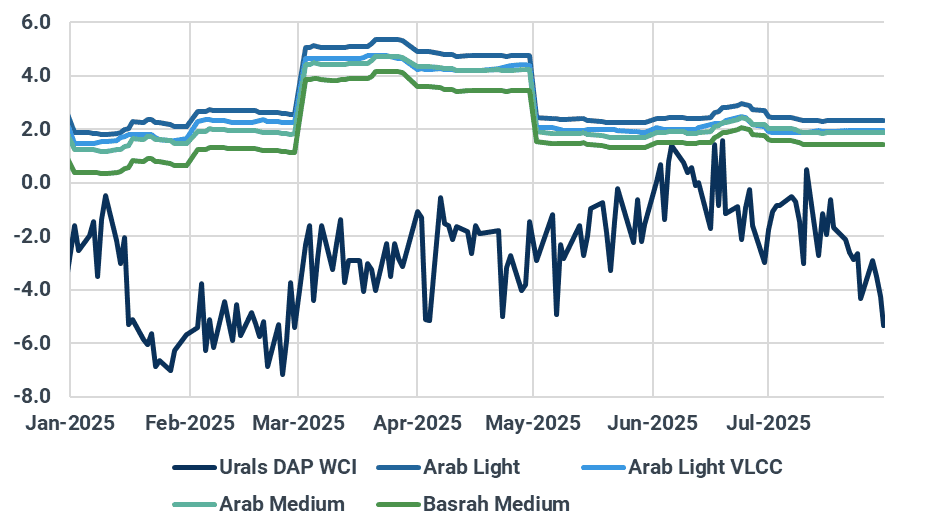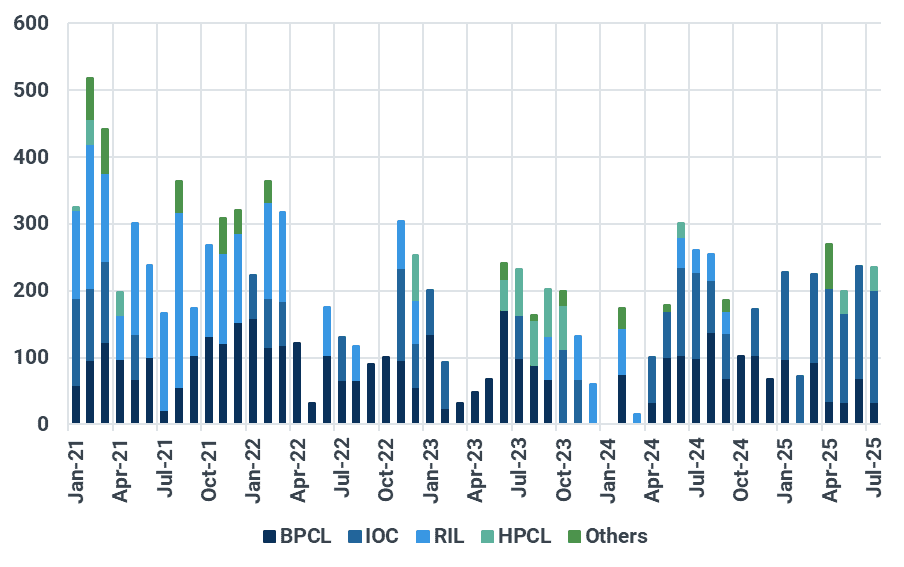Urals discount into India widens as demand drops
Market & Trading Calls
- Bearish on Urals prices as Indian refiners are reducing exposure to Russian barrels under rising US and EU pressure.
- Bullish on US crude flows into India as US–India trade talks are likely to mandate increased energy imports. India has already ramped up US crude to 225 kbd; we see scope for another 100 kbd upside.
- Bullish on Middle Eastern sour grades differentials as Indian refiners will try to scoop much of the incremental barrels coming from the Middle East in the short-term.
The EU’s 18th sanctions package and especially threats of US secondary sanctions or tariffs are making Indian refiners rethink their buying strategy. As highlighted a week ago, this possibility is bearish for the pricing of Urals in India. Lower demand from Indian refiners is starting to have a strong effect, particularly from state-owned refiners, which are reportedly considering a full pause in imports of Russian oil. On the other side, private players are still scooping barrels, but at a lower pace. Four Aframaxes are currently waiting to discharge at Jamnagar and Vadinar.
Urals differentials to NSD have sharply widened, with current assessments showing a discount of over $5/bbl (Argus). Just two weeks ago, Urals had been trading near parity with NSD. The market shift is driven by bearish sentiment around Indian demand, which is softening in anticipation of policy change.
Urals and Middle Eastern DES India prices against NSD, $/bbl

Source: Argus Media
The downward trend for Urals is likely to continue. Firstly, Russia’s refinery runs will experience a 180 kbd drop between August and October, increasing the availability of Urals cargoes in the export market. Secondly, persisting uncertainty around US actions in regards to India will trigger more risk-averse behaviour from Indian state-owned and private refiners.
The bigger picture points toward a structural pivot. US–India energy trade is already valued at ~$7.5 bn/year, including $6 bn of crude. A likely outcome of the ongoing trade talks is an official commitment from India to significantly increase oil and gas purchases from the US, mirroring the EU-US agreement. This has already started to be the case, with the country’s imports of US crude on the rise lately to an average of 225 kbd since May, nearly twice as much the levels from early 2025. Indian refiners could realistically increase their intake of US crude by another 100 kbd to previous highs of ~300 kbd in 2021. Indian Oil reportedly just bought 7-8 Mbbls of WTI and UAE’s Das blend for October delivery.
Still, replacing Russia’s 37% market share will be costly for Indian players and we remain sceptical that India will fully stop importing Russian oil. For its part, the Trump administration will want to avoid oil price spikes in H2 2025, aiming to ease inflation and to continue to pressure the Fed to cut rates.
India oil imports from the US by buyer, kbd

Source: Kpler
Want market insights you can actually trust?
Kpler delivers unbiased, expert-driven intelligence that helps you stay ahead of supply, demand, and market shifts.
Trade smarter. Request access to Kpler today.

See why the most successful traders and shipping experts use Kpler










